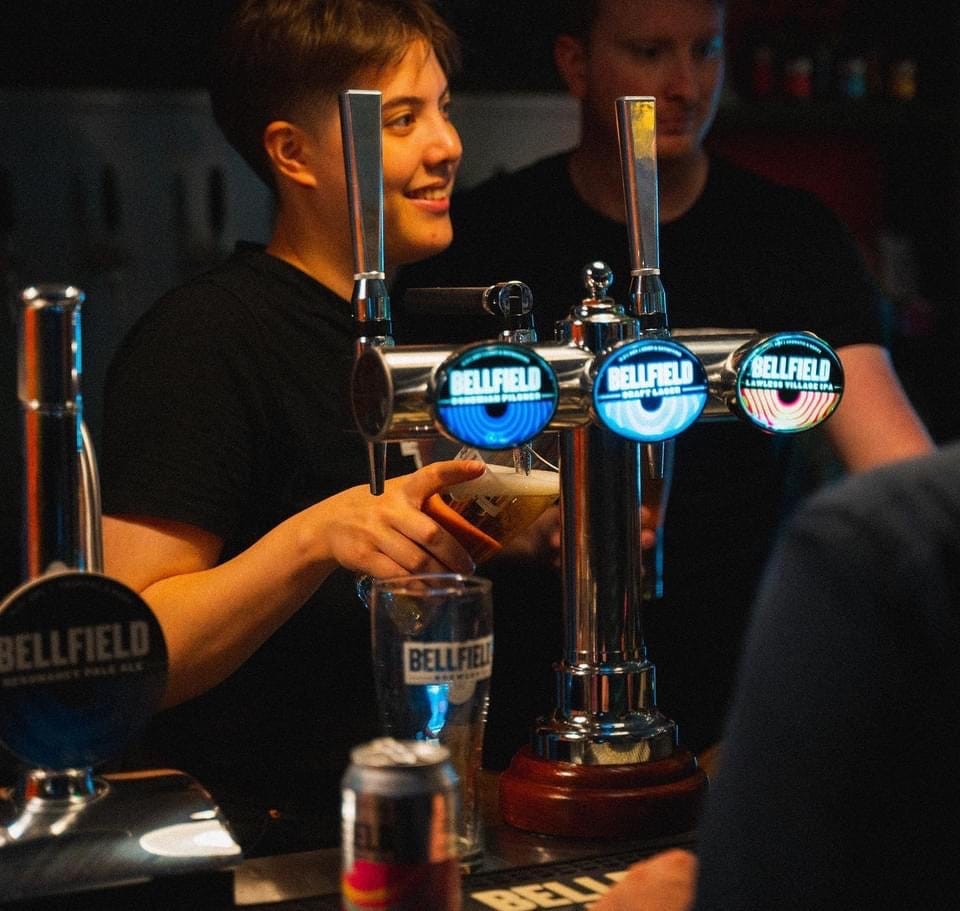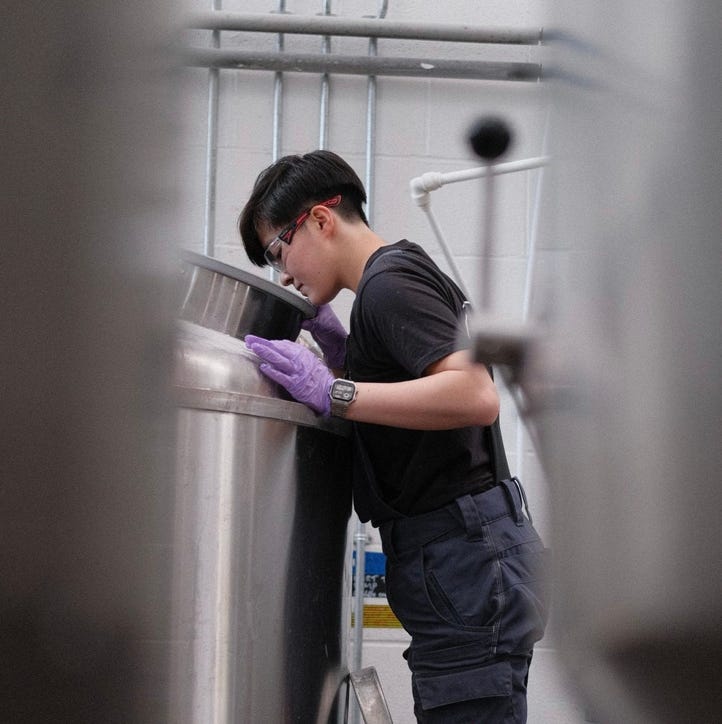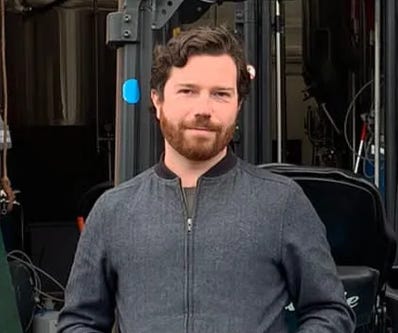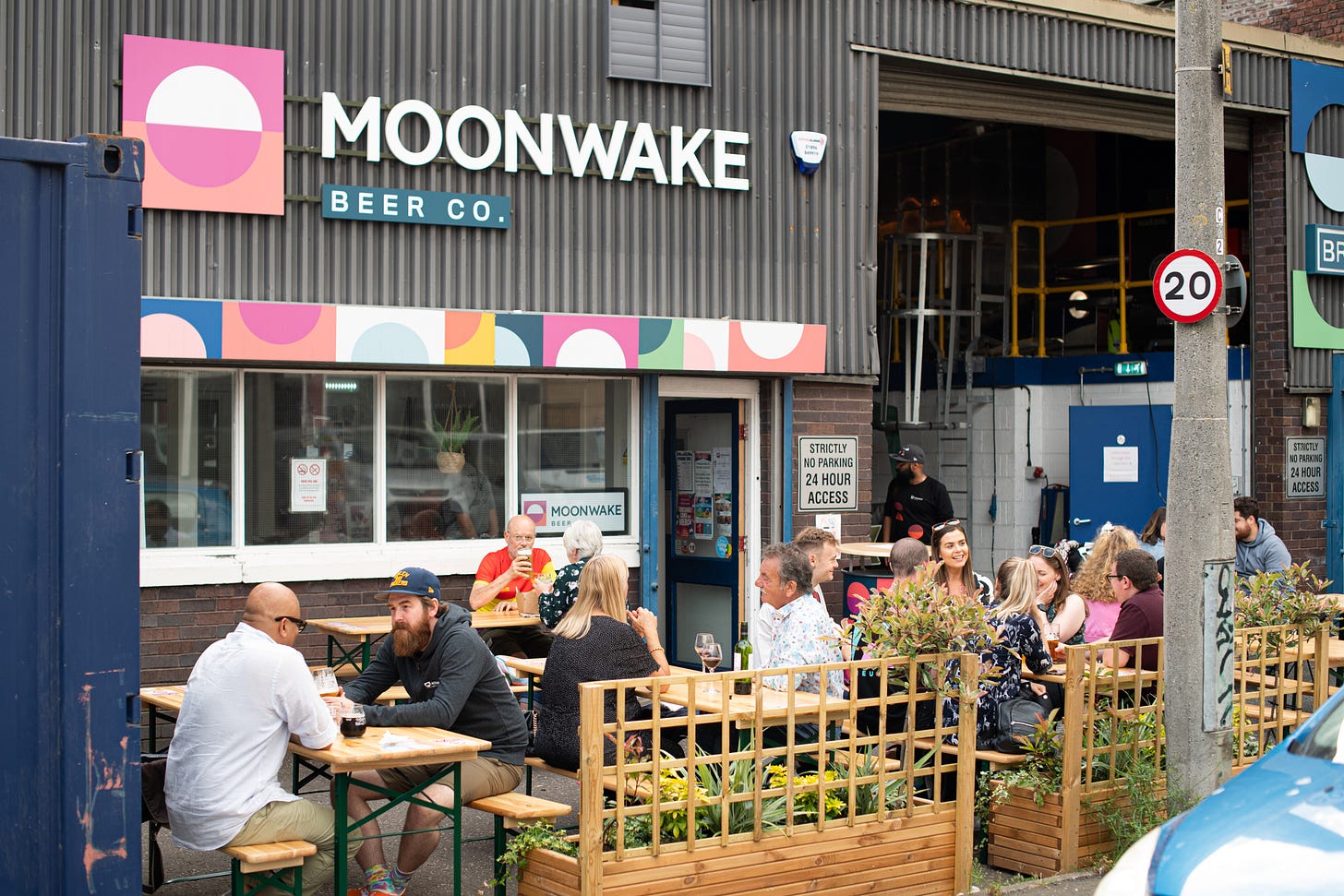'The city is absolutely on the up in terms of being a global beer destination for tourists'
We raise a glass to Edinburgh's independent breweries after three win top honours at the Scottish Beer Awards
Three cheers for Edinburgh’s glorious independent breweries.
If you are looking for the best brewery in Scotland, the best small brewery or the ‘beer destination of the year’, then you are in the right place. Impressively, all of them can be found in Edinburgh, or more precisely in or close to Leith, where a good deal of the city’s thriving new brewing industry can be found.
“If you think of all the breweries in Edinburgh producing fantastic beer,” says Alistair Brown, founder and CEO of Bellfield Brewery, “the city is absolutely on the up in terms of being a global beer destination for tourists.”
When Bellfield was named the overall Brewery of the Year at last week’s Scottish Beer Awards, it wasn’t just a moment of triumph and celebration, it was one of reflection after a torrid time for the industry.
“Across the UK hundreds of breweries have gone as a result of Covid including some local ones like, Top Out Brewery in Loanhead, who were lovely guys,” says Brown.
Bellfield has a distinctive origin story, having been founded in Portobello in 2015 by two friends who discovered they were coeliac. Brown who was STV's chief technology officer at the time has a digital background having worked on the websites of The List, The Scotsman and Financial Times.
He admits: "When I was diagnosed I thought, I can't drink beer and I can’t eat pies. My life is over." Instead, he teamed up with public relations expert Giselle Dye whose husband, Robin, was also coeliac, and together they founded Bellfield Brewery. At the time, in 2015, there were very few tasty gluten-free beers around. Bellfield only makes gluten-free and vegan beers. "The ambition always was to brew beers that were just as good as anything else," Brown adds. The stack of taste awards for their beers are testament to them achieving that.
The explosion in the number of craft beer makers across the UK in recent years might make it appear to the casual observer like owning a small brewery has been a license to print money, but that is far from the case with margins being squeezed from every side.
Although there is a strong spirit of cooperation amongst the Edinburgh brewing community with everyone helping each other out, competition is fierce.
“Although we might be great pals, the sales guys are going toe to toe trying to get a listing in a bar, it's pretty brutal and price is a huge factor. It’s all about getting them to serve your beer and make money on it. It's just really tough,” explains Brown, before adding in a spirit of camaraderie: “If you're not buying Bellfield, then do buy from other local independent breweries.”
As a result of Covid, Brexit and the cost of living crisis, the brewing and hospitality sectors have faced huge challenges. The British Beer & Pub Association reveals six pubs closed permanently in Scotland in 2020, with another 38 in 2021, and in 2022 a further 56.
The pandemic, in particular, was tough for breweries, Brown says. “Lockdown nearly proved catastrophic for business, as 95% of our sales disappeared overnight. But thankfully because of our digital backgrounds, we were well-prepared for online sales. Our sales went from next to nothing to 7,000% growth year on year from 2019 to 2020. It was the only way we could sell beer.”
Bellfield makes a range of beers, lagers and ales, and their Abbeyhill taproom, often described as a “hidden gem” as it is tucked away in Stanley Place, between London Road and Holyrood Park, opened in 2019. Their beer is sold yards from the brewery, just 10 minutes’ walk from Holyrood Palace. The busy taproom features a rota of ever-changing local independent pop-up food vendors as well as selling award-winning beers.
Neil Walker, Head of Communications at the Society of Independent Brewers (SIBA), says an unexpected positive to come out of lockdown was the number of people discovering their local craft brewery.
“This is one of the reasons we have seen a huge growth in brewery taprooms and direct-to-consumer beer sales from brewers,” he explains. “By buying beer direct from your local independent brewery you’re helping create jobs in the local community, supporting the local economy, and putting money back into Scotland rather than giving it to global beer companies.”
Brown agrees: “There is a pattern that breweries with taprooms have been able to survive, ours really saved us. Our online sales raised our profile and a lot of people discovered our taproom on their doorstep, there was a certain ethos of trying to support local independent businesses and we certainly benefited from that.”
Walker explains more about the challenges facing the sector. “Independent breweries in Scotland and across the UK have seen raw material and energy costs rise sharply in recent years, putting pressure on their already thin margins. But the biggest issue independent breweries face is a very simple one - getting their beers onto bars which are largely controlled by the global brewers or large pub-owning companies.”
Brown explains the issue. “Edinburgh has more pubs per head of population than pretty much anywhere else in the UK, but the vast majority of these pubs are tied (meaning they have to sell the beers made by the large corporate breweries). Beer drinkers in the capital often have an illusion of choice. That's what makes it so competitive and challenging - all these independents are scrambling over the scraps.”
Louise Maclean, director of Cold Town Beer, part of pub operator Signature Pub Group, agrees: “There’s a really good craft beer scene in the city with truly authentic craft brewers, but none of us are in it for the money, that's for sure. The main thing we're all clamouring for is a reduction in VAT.”
The grassroots Campaign for Pubs has been lobbying for a temporary cut of the VAT rate to 5% for sales in all hospitality venues for 12 months to stave off more pub closures and support the industry’s post-Covid revival.
Cold Town House is a working bar and microbrewery so you can see how they operate and follow the pipes from tank to tap. It offers drinkers a one-stop shop, over three floors in the Grassmarket complete with a roof terrace.
Back in Leith, the much smaller Campervan Brewery, has also been celebrating after being named Scotland’s Small Brewery of the Year.
Joseph Trotter, Campervan’s sales manager, highlights another challenge the Capital’s award-winning small breweries face - no entry point to major events like the Festivals and Edinburgh’s Christmas Markets. He points out: “Only big beer brands supply those venues, it’s not available to independent breweries that pay their taxes in Edinburgh, and as a result, all that profit goes elsewhere. Edinburgh Council has a lot to answer for here, we need a lot more support from the council and the tourist bodies, they could put something within the tenders to say, if you get this licence, you have to include three lines of local beer.”
Campervan started when Paul Gibson reassessed his career after two family members became ill and he needed a career break. That made him follow his passion for homebrew. He converted his beloved VW Camper into a mobile brewery which enabled him to handcraft small batches of beer which he dispensed from his campervan, named ‘The Hoppy Camper’.
The Campervan Brewery and taproom opened in Leith in January 2017, and in 2020 they opened their Lost in Leith pub in Commercial Street which showcases Campervan’s beers alongside other weird and wonderful independent brews. Gibson is the sole brewery owner which has expanded sustainably. Trotter believes this is one of the main reasons Campervan has survived.
"We have never overreached ourselves, there wasn't a mountain of debt, or shareholders who are chomping at the bit for a sale or their dividends,” says Gibson. But they have plans for a big and much-needed expansion in the new year.
Thinking locally has been good for business at all of the city’s micro-breweries.
At Bellfield, Brown says: “We try and do the right thing, wherever we can we use local electrical companies or gas engineers. It is nice to give local independent businesses a leg up. Every penny you spend here is invested in creating jobs.”
Scotland’s brewery of the year is not alone in their philanthropic ventures, like the annual International Women's Day beer, with profits going to Scottish Women’s Aid. Cold Town Beer supports Street Assist and makes Doddie Beir for the My Name’5 Doddie Foundation.
Campervan also makes a beer called Persevere, name after the port’s motto, with profits donated to local charities, and recently became the inaugural sponsor for Leith women's rugby team.
Trotter adds: “I think when you are a very small, independent business, you can stand up for the things you believe. You are in control of your own destiny, and it becomes a moral choice. I think that’s really important and is very much the ethos of Campervan Brewery.”
When he won best small brewery at the Scottish Beer Awards, Trotter says: “It was really affirming to be nominated and recognised by the industry for the things that we think we do well; making really good beers, being community-focused, improving our outreach.”
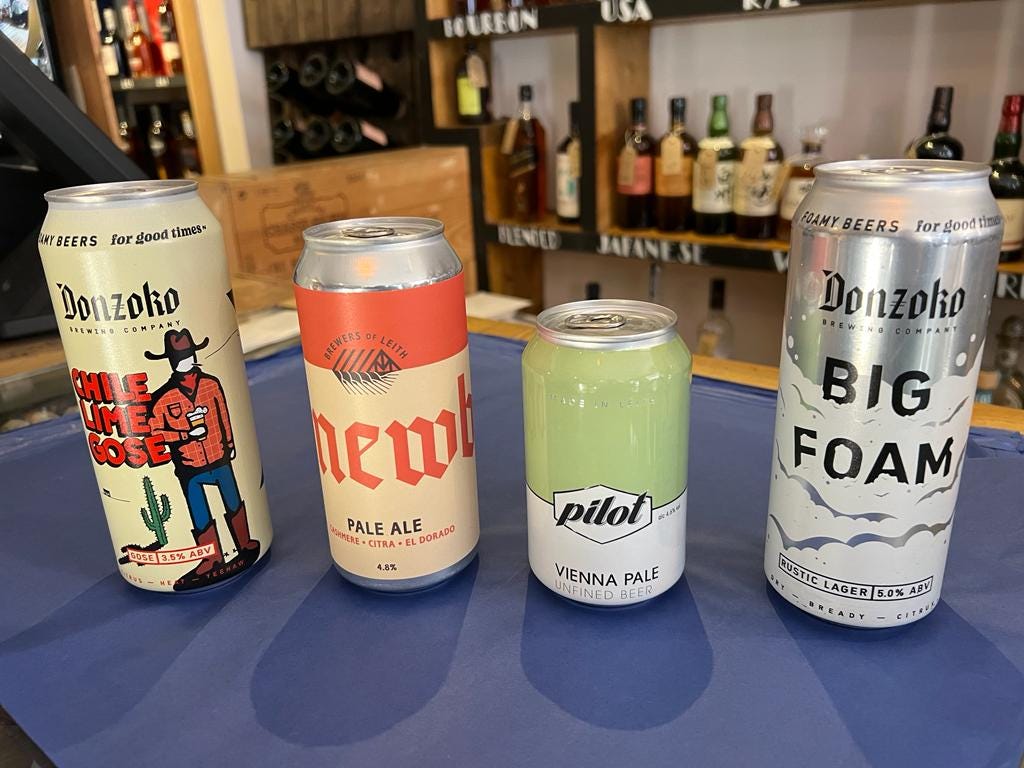
Leith now has its own busy brew scene which is not just surviving but thriving, with Newbarns Brewery, in Jane Street, Moon Wake Beer Co, Pilot Beer, and Donzoko, which has made a massive impression with its incredible can designs, including its cactus and cowboy on the Chile Lime Gose citrus ale. Trotter believes that is due, in part, to “a huge amount of support from our local community”.
“It doesn’t matter if you are born in Leith or have moved here,” he adds, “everyone is proud of the local area. The community aspect is hugely important, all the local businesses and customers know that we produce good beer, and that's made around the corner by decent people.”
Moon Wake Beer Co founded by Kiwi head brewer Vinny Rosario and Finlay Heslop, originally from Oxford, just over two years ago. The pair spent the first months of the pandemic painting the brewery's eye-catching mural. Sarah Sinclair, Marketing & Events Manager Moon Wake, explains Edinburgh was always the place they wanted to set up, “They saw opportunity in Edinburgh with the traditional pub culture around here pubs like Leith Depot and Teuchters Landing.”
The brewery was over the moon to be named Beer Destination of the Year at this year’s Scottish Beer Awards for their taproom and Lunarpalooza! Beer Festival. She adds: “We've poured our heart and soul into this brewery. We wanted to have a Taproom in the brewery where you can see beer getting made, but to make it accessible and inclusive for people to be able to come in even if they have never tried craft beer before.
“The more breweries you get in a concentrated space, the more it creates a destination for people to go to which is really great.”
There is certainly a real global buzz about the Edinburgh brew scene right now. Now that is something worth raising a pint of local ale to.

BEER MATTERS: HOW TO DEFINE A CRAFT BREWERY.
The basic definition of a craft brewery is a small, independent outfit which brews beer in limited quantities, adds Kenny Kemp
If you make beer for commercial purposes, you must pay beer duty. In the Finance Act (No 2) 2023, beer is defined as including ale, porter, stout and any other type of beer which is made or sold as beer. This includes mixtures of beer with non-alcoholic drinks, for example, with lemonade shandy.
However, there is a Catch 22 which can prevent small breweries breaking into the big time. This is something which BrewDog, Innis & Gunn, William Bros in Glasgow, and Stewart Brewing in Loanhead, who all started out as Scottish craft breweries, have been contending with.
Brewers with an annual production of not more than 4,500 hectolitres – or 450,000 litres - are eligible for a reduced rate of beer duty. This has encouraged the growth of the sector in Scotland. In the UK, craft breweries are defined as breweries that produce less than 500,000 litres of beer annually. Duty is charged on the litres of pure alcohol and alcoholic strength (alcohol by volume) of the beer, while Small Brewers Relief (SBR) has been replaced by Small Producer Relief (SPR). It gives craft brewers an advantage for small batches and innovative tastes.
But if a craft brewery wishes to increase its volumes beyond the duty limit, it faces a substantial increase in beer duty. This means massive investment in plans to build brewing capacity and marketing is required to sell those increase beer volumes.
So today, the UK’s beer scene is still dominated by the large, commercial breweries with only a few independent players flying the flag for true craft beer. So we should be supporting our craft brewer to grow – but only if they want to do so.



